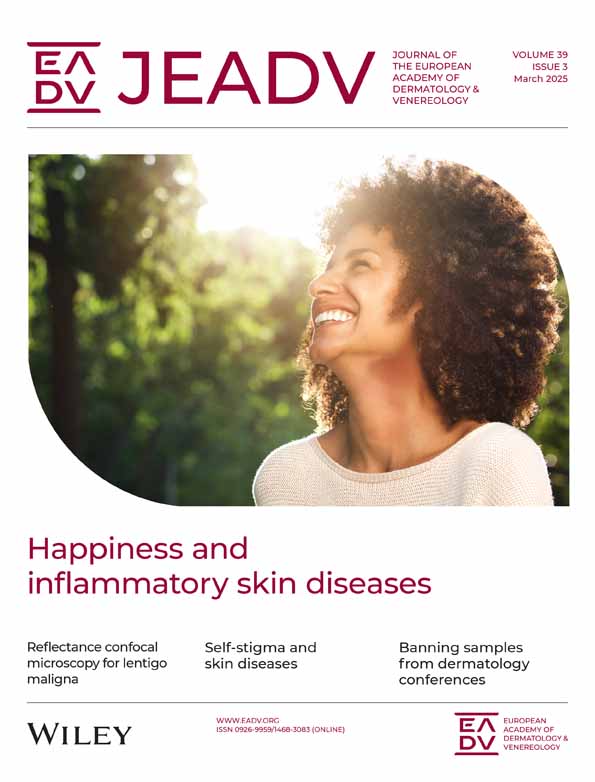Beyond the surface: Integrating sex and gender in dermatologic therapy
Linked article: S. Preis et al. J Eur Acad Dermatol Venereol. 2025;39:512–528. https://doi.org/10.1111/jdv.20256.
In recent decades, dermatology has seen significant progress in the development of targeted and biologic therapies for inflammatory skin diseases. Yet, as underscored by the systematic review by Preis et al.,1 medical research and clinical practice have too often marginalized sex- and gender-based variations, creating a one-size-fits-all approach. This newly published work dives into how both biological (sex) and sociocultural (gender) factors alter disease trajectories, therapeutic outcomes and risk profiles in dermatological conditions such as psoriasis and atopic dermatitis.
A noteworthy finding of this systematic review is the discrepancy in treatment success and adverse events between men and women. In psoriasis, for instance, female sex was frequently linked to increased side effects,2 as also shown in our more recent work from Switzerland.3 Paradoxically, lower treatment response was seen in other studies.4 These observations imply that weight-based dosing, hormonal milieu, psychosocial variables or adherence may skew women's clinical outcomes. While it remains difficult to separate strictly biological processes from sociocultural influences, the review highlights how chronic disease burden may be amplified in women, often leading to earlier discontinuation of systemic therapies.
In addition, the review documents that men tend to more readily receive systemic treatments and at a younger age, suggesting possible biases in the initiation and timing of intervention.5 For women of childbearing age, concerns over teratogenic risks and physician hesitancy may delay the start of systemic therapies. Moreover, insufficient patient-level knowledge about psoriasis, as well as lack of clinical studies with safety data in pregnancy, is frequently cited as barriers. This delay can perpetuate the underutilization of potentially beneficial treatments in women, while men—though less likely to have childbearing concerns—may face other healthcare hurdles such as reluctance to seek early dermatologic consultation.
As the authors rightly note, existing data predominantly conflate ‘sex’ and ‘gender’ into a single category, making it difficult to measure how purely biological differences (e.g., hormonal fluctuations and body mass index) interact with social and psychological factors (e.g., stigma and cultural norms). Standardizing study designs to define ‘sex’ and ‘gender’ more precisely would greatly improve clarity around treatment outcomes. Indeed, the call for more granular trials resonates with the shift towards personalized medicine, wherein each patient's biological background and social context could inform optimized therapeutic pathways.
Finally, is it truly time for novel, sex-specific dermatologic guidelines? The authors present compelling evidence that a blanket ‘one-guideline-fits-all’ approach misses critical nuances in disease response, side effects and patient adherence. They contend, however, and we strongly agree that while the gap is there, new guidelines will require further targeted basic research, as well as a conscious effort to incorporate sex and gender medicine frameworks in every stage of clinical study design.
In summary, this comprehensive review emphasizes an overdue paradigm shift in dermatology: recognizing and systematically addressing how sex- and gender-based differences shape treatment outcomes. Though the current data are especially robust in psoriasis, similar trends likely apply to other inflammatory dermatoses. Continued research in this field, backed by well-designed clinical trials, is certain to usher in a more inclusive era of skin care—one where all patients will benefit from truly individualized therapies.
ACKNOWLEDGEMENTS
Thank you to all the members of the Skin Disease in Pregnancy Task Force of the EADV for their on-going efforts.
FUNDING INFORMATION
None to declare.
CONFLICT OF INTEREST STATEMENT
IB is an employee of the University Hospital of Zurich and PhD candidate at the University of Zurich and has declared no conflict of interest.
JTM has served as advisor and/or received speaking fees and/or participated in clinical trials sponsored by AbbVie, Almirall, Amgen, BMS, Celgene, Eli Lilly, Incyte, LEO Pharma, Janssen-Cilag, MSD, Novartis, Pfizer, Pierre Fabre, Roche, Sanofi and UCB.
Open Research
DATA AVAILABILITY STATEMENT
Data sharing is not applicable to this article as no new data were created or analysed in this commentary.




